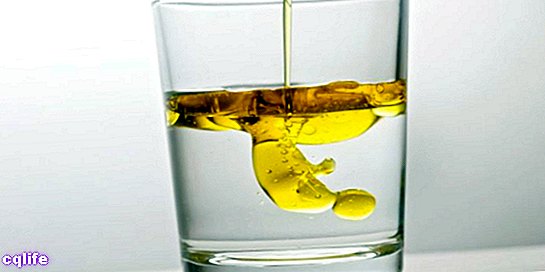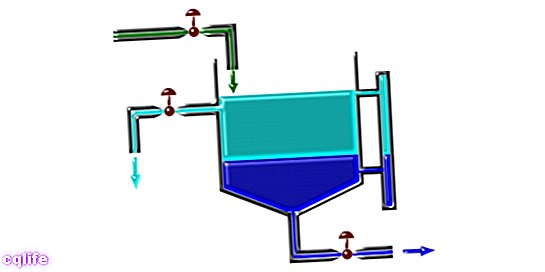We explain what decantation is and the ways in which it can be carried out. Also, some examples and methods of separation.

What is decantation?
Decantation is known as a physical procedure that serves to separate a heterogeneous mixture composed of a solid or liquid of higher density, and a liquid of lower density. density.
This procedure consists of the separation of the densest component (solid or densest liquid), from the liquid less dense, by action of the gravity. Let the mixture in a container (generally separating or separating funnels are used) and, in this way, the denser component descends by action of gravity towards the bottom of the funnel and the less dense component remains at the top.
Finally, the densest component is removed from the bottom. These types of tools for separating mixtures generally have several wrenches attached in different positions, which can be opened and closed to remove the desired component. A demonstrative example is shown in the following figure, where the mixture is of color green, dark blue liquid is the densest component and light blue liquid is the least dense component.

This process is widely used in laboratories and processes industrial, especially using separatory funnels or similar tools. It should not be confused with sedimentation or gravitational separation, which consists of the separation of solid waste suspended in a liquid (such as Water and sand) by the mere effect of gravity.
There are two ways in which decantation can be carried out, depending on the State of aggregation of the substances that make up the mixture:
- Solid-liquid decantation. When solid elements are deposited in a liquid medium.
- Liquid-liquid decantation. When the mixture is formed by two liquids of different densities that cannot dissolve in each other.
Examples of decantation

- Sewage treatment. The dirty waters of the sewage system of the cities are generally more dense than the clean ones, since they are full of organic material and other substances in suspension. Therefore, an initial process of decanting and filtering the dirt can be carried out before returning the water to the seas and rivers. Thus, the water is returned cleaner to the environment, reducing the pollution of environment.
- Obtaining natural oils. It is known that fats They are not soluble in water and, therefore, during the extraction of vegetable oils, decantation is usually used as a way to separate them from the water. In addition, decantation is also used to extract the solid residues that remain in the oil after crushing the palm, seed or olive.
- Biodiesel and glycerin separation. Glycerin is an unwanted by-product of process of obtaining biofuels that uses vegetable or animal fats. To separate them, the difference in densities is used in a decantation stage, which deposits the glycerin at the bottom of the container.
- Drinking water Water. In the processes to make water drinkable, various initial stages of decantation are used, which give weather clays and other suspended materials to settle to the bottom and be extracted, leaving the waters cleaner for later filtering stages.
- Decantation of wine. Wine is obtained from fermentation of the grapes, so it is necessary to separate the liquor from the physical residues that remain and that can often re-form in the bottle, after some time of sedimentation. The experts in the field then recommend applying a decantation process to extract the sediments and also oxygenate the wine. It is something usual in long-maturing wines.
- Manufacture of vinegars. The refinement of vinegar of vegetable origin requires decanting stages, in which it is separated from the heavier vegetable oils (also valuable), obtained during the transformation of the raw material.
- Oil refining. The Petroleum It must be refined to reach the necessary degree of hydrocarbon purity that allows its derivatives to be obtained. From this process there are several hydrocarbons useful in gaseous state or liquid, which can be separated from the rest of the mixture by decantation. Thus, the lightest hydrocarbons are extracted and the densest ones continue to be refined in the lower part of the deposits.
- Oil extraction on offshore platforms. When extracting oil from reservoirs on the seabed, it is common for the oil to mix with seawater. This is remedied by decanting the mixture, since oil is much denser than water. The latter is stored and instead the water is returned to the ocean.
Mixture separation methods
Mixture separation methods, also called phase separation methods, are the different physical (never chemical) procedures that allow the different components of a mixture to be separated, using the different physical properties that each one presents.
So for these methods work, we must be in the presence of mixtures whose components retain their identity in the mixture and do not take place chemical reactions that permanently alter their properties as a result of mixing them.
